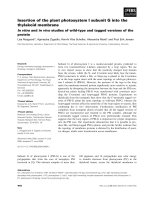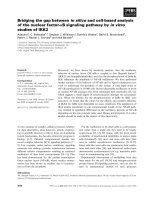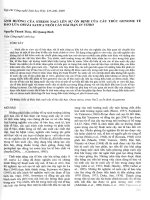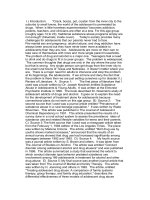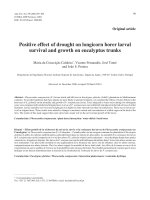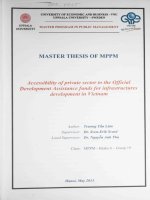Effect of Jasmonic Acid (JA) and glutamine on callus induction of madagascar periwinkle plant (Catharanthus roseus L. cv. Nirvana Pink Blush) by in vitro culture
Bạn đang xem bản rút gọn của tài liệu. Xem và tải ngay bản đầy đủ của tài liệu tại đây (329.92 KB, 8 trang )
Int.J.Curr.Microbiol.App.Sci (2017) 6(5): 1415-1422
International Journal of Current Microbiology and Applied Sciences
ISSN: 2319-7706 Volume 6 Number 5 (2017) pp. 1415-1422
Journal homepage:
Original Research Article
/>
Effect of Jasmonic Acid (JA) and Glutamine on Callus
Induction of Madagascar Periwinkle Plant
(Catharanthus roseus L. cv. Nirvana Pink Blush) by in vitro Culture
Ekhlas Meteab Ahmed Al-Zuhairi1* and Nadhm Salim Ghanm2
1
Assistant Lecturer, Horticulture Department, College of Agriculture, University of Diyala, Iraq
2
Lecturer, Horticulture Department, - College of Agriculture, University of Tikrit, Iraq
*Corresponding author
ABSTRACT
Keywords
Benzyl amino
purine, Callus,
In vitro, Jasmonic
acid, Glutamine.
Article Info
Accepted:
17 April 2017
Available Online:
10 May 2017
The current study was conducted to examine the role of Jasmonic acid and Glutamine in
callus growth and multiplication. Seeds were germinated after disinfect by NaOCl at 4.5%
for 20 min and cultured on full strength Murashige and Skoog (1962)(MS) medium. callus
was initiated from Cotyledons explants taken from seeding were cultured growth on MS
medium supplemented with different concentration of growth hormone include the
Cytokinins Benzyl Amino Purine (BAP) at concentration (0.0,2.0) mg/l. and Auxin
Naphthalene Acetic Acid (NAA) at concentration (0.0,1.0,2.0,4.0) mg/l for both growth
regulators. Depending upon the result of chemical analysis, the combination of BAP at 2.0
Mg/L with NAA at1.0 Mg/L choised and used Jasmonic acid and Glutamine with different
concentration of Jasmonic acid at concentration (0.0, 4.0) mg/l and Glutamine at
concentration (250,300,350,400) Mg/L for 8 week culture period in callus induction. The
results showed the presence of significant differences between the treatments in the fresh
and dry weight of callus after five weeks from culture. 2.0 mg/l BAP treatment was
significantly superior on control treatment in fresh and dry weight of callus, which reached
0.335 and 0.160 mg, respectively. Also, the two concentrations of NAA (1.0 mg/l) were
significantly superior on control treatment in the same of two characteristics (0.332 and
0.150 mg fresh weight, and dry weight, respectively). The treatment of interaction between
BAP and NAA (0.2+1.0 mg.L-1) has given the highest significant difference in fresh and
dry weight reached 0.483 and 0.215 mg, respectively. While less fresh and dry weight when
treatment was control treatment, which reached 0.0 mg. The 4.0 mg/l Glutamine treatment
was significantly superior on control treatment in fresh and dry weight of callus, which
reached 290.42 and 40.855 mg, respectively. Also, the 350 mg/l concentration of Glutamine
was significantly superior on control treatment in the same of two characteristics (286.38
and 54.664 mg fresh and dry weight). The treatment of interaction between Jasmonic acid
and Glutamine (4.0 mg/l + 300 mg/l) has given the highest significant difference in fresh
and dry weight reached 345.35 and 54.664 mg, respectively. While less fresh and dry
weight when treatment 0 Jasmonic acid + 250 Glutamine mg/l concentrations, which
reached 184.47 and 10.18 mg, respectively.
Introduction
Callus is an undifferentiated parenchyma cells
producing from the cutting and wound areas of
explants. Its induction depends on source of
explant used and medium components. Callus
1415
Int.J.Curr.Microbiol.App.Sci (2017) 6(5): 1415-1422
may be friable or solid textures and its color is
yellow, white or green depending on source of
explant and type of plant (George et al., 2000;
Trigiano et al., 2008). The hormonal balance
between auxins and cytokinins is necessary in
organogenesis by in vitro culture. It was found
that the high percentage of auxin/cytokinin
lead to the formation of roots. While,
increasing the level of cytokinin/auxin leads to
the formation of shoots. The balanced levels of
plant growth regulators lead to the continued
formation of callus tissue (Skoog and Miller,
1957). Taiz and Zeiger (2002) noted that
maturity cells are stimulated to divide when
cultured in medium containing plant growth
regulators, especially auxins and cytokinins.
Staba (2000) explained that callus is usually
incubated in the dark to avoid organ
formation. Jasmonic acid is considered to be
one of the growth hormones leading to aging,
which reduces the level of gene expression
(Edris, 2010).
Glutamine is an important amino acid that
enters the process of cell protein synthesis and
thus builds enzymes that play an important
role in the plant's biosynthesis.
It also
regulates the acid and base balance of the cell
to produce ammonia, an important source of
cellular energy or a source of carbon.
Glutamine also gives nitrogen in many bioprocesses, including the synthesis of purines
that are involved in building nucleic acids, an
important carrier of ammonia (Brosnan, 2003;
Aledo, 2004; Guyton, 2006; Yuneva et al.,
2007).
Taha et al., (2009) found when their culturing
callus of periwinkle plant on liquid MS
medium supplemented with five types of
amino acids and 300 mg.L-1 glutamine leads
to increased quantities of Vincristin and
Vinblastin formed. The aim of this study is to
know the effect of acid Jasmonic and
Glutamine in the induction and differentiation
of callus of cotyledon leaves of periwinkle
seedlings.
Materials and Methods
This project was conducted in the plant tissue
culture laboratory, in the Department of
Horticulture and Landscape Design, College
of Agriculture, University of Diyala. During
21 May – 25 October / 2015. The major
objective of this study was to increase the
production of callus to the tissue culture
medium Catharanthus roseus L. The
periwinkle seeds cv. Nirvana Pink Blush
obtained from the American seed production
company "Pan. American"
Explants sterilization
Periwinkle seeds cv. Nirvana Pink Blush of
current study equipped by the American
company for seed production. This seeds were
isolated and washed thoroughly under tap
water to remove dust on the seed coat. Then
the seeds were sterilized with 4.5 % sodium
hypochlorite solution with 3-4 drops of
tween20 for 20 minutes (Al-Zuhairi, 2016)
and washed 3-4 times with distilled water
inside the laminar air-flow cabinet. The
sterilized seeds cultured on MS medium
without hormones. They placed in a growth
room
under
controlled
conditions
(temperature 25±2°C, 16/8 h photoperiod).
Cotyledons were excised from cultures after 6
weeks from seed culture.
The media preparation
MS salts (Murashige and Skoog, 1962),
vitamins (1.0 mg.L-1), plant growth regulators
and sucrose (30 gm.L-1) are using in the
medium of callus induction. The pH of
medium is adjusted to 5.7 by sodium
hydroxide and hydrochloric acid solution
concentration of 0.1 N for each of them.
Naphthalene acetic acid (NAA) added to MS
medium in different concentrations (0.0, 1.0,
2.0 and 4.0 mg.L-1). Benzyl Amino Purine
(BAP) added at two concentrations (0.0 and
1416
Int.J.Curr.Microbiol.App.Sci (2017) 6(5): 1415-1422
0.2 mg.L-1). The different concentration of
NAA and BAP were used to determine the
optimal concentration for callus induction.
Callus induction
The cotyledons cultured in MS medium
(10ml) supplemented with 0.0 or 2.0 mg.L-1
(BAP) and 0.0, 1.0, 2.0, 3.0 or 4.0 mg.L-1
(NAA). Each treatment represented ten
replications.
Callus was multiplied through the cultivation
of the best medium (MS salts + 2.0mg.L-1
BAP + 1.0mg.L-1NAA).
Callus was multiplied through the cultivation
of the best medium (MS salts +Jasmonic acid
at 0.0, 4.0 mg.L-1Glutamine + 250, 300, 350,
400mg.L-1).
Effect of NAA and BAP on callus
multiplication
Has been taking the weight of 100 mg of
callus was grown on MS medium containing:
0.0 or 2.0 mg.L-1 BAP + 0.0, 1.0, 2.0, 3.0 or
4.0 mg.L-1 NAA. Each treatment represented
ten replications. They placed in a growth
room
under
controlled
conditions
(temperature 25±2°C and darkness). The fresh
and dry weights of callus were calculated
after 8 weeks from culture.
Effect of jasmonic acid and glutamine on
callus multiplication
Has been taking the weight of 150 mg of
callus was grown on MS medium containing:
4.0 mg.L-1 BAP + 1.0 mg.L-1 NAA + 0.0, 4.0
mg.L-1Jasmonic acid+ 250, 300, 350 or 400
mg.L-1. Glutamine Each treatment represented
ten replications. They placed in a growth
room
under
controlled
conditions
(temperature 25±2°C and darkness). The fresh
and dry weights of callus were calculated
after 8 weeks from culture.
Statistical analysis
Completely randomized design was used with
10 replicates. The data were subjected to the
analysis of variance and mean values were
compared using revised-LSD as described by
Snedicor and Cochran (1980).
Results and Discussion
Effect of BAP and NAA on callus
multiplication
Results from the two tables (Tables 1 and 2)
showed the presence of significant
differences between the treatments in the
fresh and dry weight of callus after 8 weeks
from culture. The 2.0 mg.L-1 BAP treatment
was significantly superior on control
treatment in fresh and dry weight of callus,
which reached 0.335 and 0.160 mg,
respectively. Also, the concentrations of
NAA (1.0 mg.L-1) were significantly superior
on control treatment in the same of two
characteristics (0.332 and 0.272 mg fresh
weight, and 0.150 mg dry weight,
respectively). The treatment of interaction
between BAP and NAA (2.0+1.0 mg.L-1) has
given the highest significant difference in
fresh and dry weight reached 0.483 and 0.215
mg, respectively. While less fresh and dry
weight when of callus induction (Plate 1, A)
when treatment was without growth
regulators (control treatment), which reached
0.0 mg. The reason for the fresh and dry
weight increase of callus are cytokinin (BAP)
and auxin (NAA), which are also a growth
promoters that have a significant and
important role in cell division, leading to
increased size and weight. The reason for the
increase in the fresh and dry weight of callus
is cytokinin (benzyl amino purine) and auxin
(naphthalene acetic acid) by encouraging
growth and their role in the division and
enlargement of cells that led to increased
callus in size and weight. This may be due to
1417
Int.J.Curr.Microbiol.App.Sci (2017) 6(5): 1415-1422
the physiological balance between auxin and
cytokinin. The addition of both growth
regulators to the medium of culture is
necessary for the induction of callus.
Cytokinin works with auxin as a key to
initiating cell division. Adenine, the
cytokinin molecule, may be the optimal
balance. The difference between explants
may be due to the anatomical structure and
its physiological development (Goodwin,
1985; Mineo, 1990).
Effect of jasmonic acid and glutamine on
callus multiplication
The tables 3 and 4 showed the presence of
significant differences between the treatments
in the fresh and dry weight of callus after five
weeks from culture. The 4.0 mg.L-1 Jasmonic
acid treatment was significantly superior on
control treatment in fresh and dry weigh of
callus, which reached 290.42 and 40.855 mg,
respectively. Also the 300 and 350 mg.L-1
concentration of Jasmonic acid was
significantly superior on control treatment in
the same of two characteristics (46.947 and
286.38 mg fresh and dry weight). The
treatment of interaction between Jasmonic
acid and Glutamine (300 mg.L-1+ 4.0 mg.L-1)
has given the highest significant difference in
fresh and dry weight of callus induction (Plate
1C) reached 345.35and 54.664 mg,
respectively.
Table.1 The chemical material composition additives to MS medium used for callus induction
Seq.
1
2
3
4
5
6
7
Chemical material
Salt
Pyrodoxine –Hcl
Glycine
Nicotine acid
Thiamine–Hcl
Myo-inositol
Agar
Quantity (mg l-1)
full strength
0.5
2.0
0.5
0.1
0.1
7000
8
9
Sucrose
Benzyl Amino
Purine (BAP)
Naphthalene acetic
acid(NAA)
30000
(0.0,2.0)
10
0.0,1.0,2.0,4.0))
Table.2 Effect of NAA and BAP on fresh weight of callus (mg) induced from cotyledonary leaf
of the periwinkle plant by in vitro
NAA concentration (mg.l-1)
BAP
concentration
(mg.l-1)
0.0
1.0
2.0
4.0
0.0
2.0
0.000 D
0.245BC
0.182BDC
0.483A
0.167BDC
0.311AB
0.093DC
0.302ABC
Mean of NAA
0.123B
0.332A
0.239AB
0.198AB
1418
Mean of BAP
0.110B
0.335A
Int.J.Curr.Microbiol.App.Sci (2017) 6(5): 1415-1422
Table.3 Effect of NAA and BAP on dry weight of callus (mg) induced from cotyledonary leaf of
the periwinkle plant by in vitro
NAA concentration (mg.l-1)
BAP
concentration
(mg.l-1)
Mean of BAP
0.0
1.0
2.0
4.0
0.0
0.000 B
0.087AB
0.090AB
0.096AB
0.068B
2.0
0.108AB
0.215A
0.150AB
0.172AB
0.160A
Mean of NAA
0.054A
0.150A
0.120A
0.134A
Table.4 Effect of Jasmonic acid (JA)and Glutamine on fresh weight of callus (mg)
induced from cotyledonary leaf of the periwinkle plant by in vitro.
Jasmonic
acid(JA)con
Glutamine concentration (mg.l-1)
Mean of
centration
(mg.l-1)
250
300
350
400
Jasmonic
acid(JA)
0.0
184.47D
202.55DC
269.52B
251.79BC
227.08B
4
254.76BC
345.35A
303.25AB
258.33BC
290.42A
Mean of
219.61B
273.95A
286.38A
255.06AB
Glutamine
Table.5 Effect of Jasmonic acid (JA) and Glutamine on dry weight of callus (mg)
induced from cotyledonary leaf of the periwinkle plant by in vitro
Glutamineconcentration (mg.l-1)
300
350
Jasmonic
acid(JA)concen
tration (mg.l-1)
250
0.0
10.18C
19.473BC
42.001A
19.714BC
22.843B
4
20.077BC
54.664A
51.893A
36.787AB
40.855A
Mean of
15.131C
37.069AB
46.947A
28.250B
Glutamine
1419
400
Mean of
Jasmonic
acid(JA)
Int.J.Curr.Microbiol.App.Sci (2017) 6(5): 1415-1422
Plate.1 Effect of Naphthalene Acetic Acid( NAA) and Benzyl Amino Purine (BAP)(A,B)and
Jasmonic acid(JA) and Glutamine(C,D) on callus multiplication of Plant
A:MS medium + 1.0 mg.L-1 NAA+ 2.0 mg.L-1 BAP
B:MS medium+ 2.0 mg.L-1 NAA+ 2.0 mg.L-1 BAP
C:MS medium+ 300 mg.L-1Jasmonic acid(JA) + 4.0 mg.L-1 Glutamine
D:MS medium+ 350 mg.L-1Jasmonic acid(JA) + 4.0 mg.L-1 Glutamine
While, less fresh and dry weight when
treatment 0 Jasmonic acid + 250 mg.L-1
Glutamine concentrations, which reached
184.47 and 10.18 mg, respectively. Study
results agreed with what he found Ueda and
Kato (1982) on the soybean plant. As noted
callus growth was significantly affected when
Jasmonic acid at low concentration (0.45-4.50
µmol) added to medium of callus induction. Li
et al., (2014), also pointed out that the Methyl
jasmonate significantly effect on the induction
and growth of callus, especially the
concentration of 125 µmol. These results
revealed this might be due to the rapid uptake
of reduced nitrogen which provided by this
amino acid (Al- Khayri, 2001). Glutamine and
glutamic acid are directly involved in the
assimilation of NH4+. A direct supply of these
amino acids should therefore enhance the
utilization of both nitrate and ammonium
nitrogen and its conversion into amino acids
(George, 1993). The addition of glutamine in
date palm tissue culture media increased callus
quality and somatic embryos formation (Jasim,
2001), add structure RNA and DNA. The
results of the study agreed with the results of
the Al-Memary (2014) to obtain the highest
fresh weight of the callus (0.697 gm) from
culturing explants of cotyledonary leaves on
the MS medium supplying 0.4mg.L-1
Glutamine. These results may be explained by
the fact that Glutamine is one of the amino
1420
Int.J.Curr.Microbiol.App.Sci (2017) 6(5): 1415-1422
acids involved in building proteins that work
on enzymes that play a role in most bioprocesses as well as the building of both RNA
and DNA (Dalaly, 1994). This is consistent
with EL-Sharabasy et al., (2012) that the
addition of Glutamine to the farming
community with the presence of growth
regulators led to a doubling of callus growth.
This, according to EL-Sharabasy et al., (2012),
suggests that the addition of Glutamine to the
culture medium, with the presence of plant
growth regulators, has callus growth and
multiplication (Table 5).
In conclusion, the positive role of Jasmonic
acid and glutamine in this study leads to the
recommendation to include them in the c
micropropagation program (callus production)
and concluded from the present study also
that cotyledon leaf of periwinkle plants have
ability of growth and induction of indirect
callus when they are cultured in the right
medium and concentration of BAP, NAA.
References
Aledo, J.C. 2004. Glutamine breakdown in
rapidly dividing cell: Waste or
investment. Bio. Essays, 26(7): 778-785.
Al-Memary, Aysar, Mohammed Salim. 2014.
callus induction and differentiation from
some explants of Catharanthus roseus L.
and determination of some Alkaloids.
Degree of Doctor, College of
Agriculture and Forestry, University of
Mosul
Al-Zuhairi, Ekhlas Meteab Ahmed. 2016.
Effect of Some Chemicals on Growth of
Madagascar
periwinkle
Plant
(Catharanthus
roseus
L.)
and
Production of Indolic Alkaloids In Vivo
and In Vitro, Degree of Master, College
of Agriculture.University of Diyala.
Aurelia, S., Lusarkiewicz, P. Aleksandro and
K. Zygmunt. 2008. Influence of cultivar
explant source on In Vitro growth of
Cannabis sativa. Plant Genet., 47: 145-
151.
Brosnan, J.T. 2003. Interorgan amino acid
transport and its regulator. J. Nutr.,
133(6 Suppl 1): 2068S-2072S. PMID
12771367.
/>3/6/2068S
Cheng, H.L.J., Yu, Q.Y., Hu, S.C., Chen and
Y.P. Sun. 2006. Establishment of callus
and cell suspension cultures of Corydalis
saxicola Arabe medicinal Plant College
of Life Science & Technology. China Z.
naturforch, 61(3-4): 2510256.
Dalaly, Basil Kamel. 1994. Basics of
Biochemistry. Ibn al-Atheer Publishing
House / University of MoAl- Khayri,
J.M. and A.M. Al- Bahrany. 2001. Silver
nitrate and 2-isopentyladenine promote
somatic embryogenesis in date palm
(Phoenix dactylifera L.). Scientia Hort.,
89: 291-298.
Edris, Mohammad Hamed. 2010. Plant
Physiology, Department of Horticulture,
Faculty of Agriculture, Al-Azhar
University, Egypt.
EL-Sharabasy, S., M.A. Farag, G.A.E. ElEmery, G. Safwat and A. Diab. 2012.
Effect of amino acid on the growth and
production of steroids in Date palm
using
tissue
culture
technique.
Researcher, 4(1): 75-83.
Friesen, L.J.K.K., Kartha, N.L., Leuna and
D.D. Songstad. 1991. Cryoprespevation
of Papaversomniferum cell suspention
cultures. Plant Medica, 57(1): 53-55.
George, E.F. and P.D. Sherrington. 2008.Plant
Propagation by Tissue Culture, Fourth
edition Ltd. England.
George, E.F. and Sherrington, P.D. 1993.
Plant Propagation by Tissue Culture.
Second
Edition,
Exegetics
Ltd.
England.
Goodwin, M. 1985. Introduction to Plant
Biochemistry. Second edition Pergamon
Press, New York.
Hall, J.E. and C.A. Guyton. 2006. Textbook of
1421
Int.J.Curr.Microbiol.App.Sci (2017) 6(5): 1415-1422
Medical Physiology (11th ed.). St. Louis,
Mo: Elsevier Saunders. P. 393.
Jasim, A.M. and Saad, A.A. 2001. Effect of
some media component on growth and
somatic embryos formation and
germination of date palm (Phoenix
Dactylifera L.) cultured in vitro. Basrah
Date Palm Res. J., 1: 1-7.
Mineo, L. 1990. Plant Tissue Culture
Techniques, C.A. Gold man Editor, pp:
151-174. Pennsylvania.
Murashige, T. and F. Skoog. 1962. A revised
medium for rapid growth and bioassay
with tobacco tissue culture. Physiol.
Planta, 15: 4473- 497.
Skoog, F. and C.O. Miller. 1957. Chemical
control of growth and bud formation in
tobacco segment and callus cultured in
vitro. J. Bot., vol. 35: 782-790.
Staba, E.J. 2000. Plant tissue culture as a
source of bio chemicals, CRC Press, Inc.
Boca raton, Florida: 1-271.
Taha, H.S., M.K. El-Bahr and M.M. Seif-ElNasr. 2009 b. In vitro studies on
Egyptian Catharanthus roseus (L.). Ii.
Effect of Biotic and Abiotic stress on
Indole Alkaloids Production. J. Appl.
Sci. Res., 5(10): 1826-1831.
Taizand, E., Zeiger. 2002. Plant physiology.
Sinaure Assciates, Inc. Publishers.
Sunderland.
Trigiano, R.N. and D.J. Gray. 2008. Plant
Tissue Culture concepts and laboratory
exercises CRC, Press LLC.
Yuneva, M., N. Zamboni, P. Oefner, R.
Sachidanandam and Y. Lazebnik. 2007.
Deficiency in glutamine but not glucose
induces
MYC-dependentapoptosisin
human cells. J. Cell Biol., 178(1): 93105.
How to cite this article:
Ekhlas Meteab Ahmed Al-Zuhairi and Nadhm Salim Ghanm. 2017. Effect of Jasmonic Acid
(JA) and Glutamine on Callus Induction of Madagascar Periwinkle Plant (Catharanthus roseus
L. cv. Nirvana Pink Blush) by in vitro Culture. Int.J.Curr.Microbiol.App.Sci. 6(5): 1415-1422.
doi: />
1422
